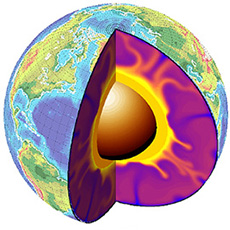Is a STEM Career for Me?
by StudyMalaysia.com on December 8, 2015 | Top Stories, Career Guide
A closer look at careers in STEM
STEM is a very vast field that continually sees new changes and additions. Let's have a look at the career opportunities under each STEM discipline as listed by O*NET OnLine.
5. Geosciences

Architectural and Engineering Managers: Plan, direct, or coordinate activities in such fields as architecture and engineering or research and development in these fields.
Geoscientists, Except Hydrologists and Geographers: Study the composition, structure, and other physical aspects of the Earth. May use geological, physics, and mathematics knowledge in exploration for oil, gas, minerals, or underground water; or in waste disposal, land reclamation, or other environmental problems.
Natural Sciences Managers: Plan, direct, or coordinate activities in such fields as life sciences, physical sciences, mathematics, statistics, and research and development in these fields.
| Examples of Other Careers in Geosciences |
|
6. Life Sciences

Biofuels Production Managers: Manage biofuels production and plant operations. Collect and process information on plant production and performance, diagnose problems, and design corrective procedures.
Dietitians and Nutritionists: Plan and conduct food service or nutritional programs to assist in the promotion of health and control of disease.
Environmental Restoration Planners: Collaborate with field and biology staff to oversee the implementation of restoration projects and to develop new products.
Food Scientists and Technologists: Use chemistry, microbiology, engineering, and other sciences to study the principles underlying the processing and deterioration of foods; analyze food content to determine levels of vitamins, fat, sugar, and protein; discover new food sources; research ways to make processed foods safe, palatable, and healthful; and apply food science knowledge to determine best ways to process, package, preserve, store, and distribute food.
Geneticists: Research and study the inheritance of traits at the molecular, organism or population level.
Zoologists and Wildlife Biologists: Study the origins, behaviour, diseases, genetics, and life processes of animals and wildlife.
| Examples of Other Careers in Life Sciences | |
|
|
7. Mathematics

Actuaries: Analyse statistical data, such as mortality, accident, sickness, disability, and retirement rates and construct probability tables to forecast risk and liability for payment of future benefits.
Mathematicians: Conduct research in fundamental mathematics or in application of mathematical techniques to science, management, and other fields.
Operations Research Analysts: Formulate and apply mathematical modelling and other optimizing methods to develop and interpret information that assists management with decision making, policy formulation, or other managerial functions.
Risk Management Specialists: Analyse and manage risk management issues by identifying, measuring, and making decisions on operational or enterprise risks for an organisation.
Statisticians: Develop or apply mathematical or statistical theory and methods to collect, organise, interpret, and summarise numerical data to provide usable information.
| Examples of Other Careers in Mathematics |
|
8. Physics/Astronomy

Astronomers: Investigate atmospheric phenomena and interpret meteorological data, gathered by surface and air stations, satellites, and radar to prepare reports and forecasts for public and other uses.
Nanosystems Engineers: Design, develop, or supervise the production of materials, devices, or systems of unique molecular or macromolecular composition, applying principles of nanoscale physics and electrical, chemical, or biological engineering.
Nuclear Medicine Technologists: Prepare, administer, and measure radioactive isotopes in therapeutic, diagnostic, and tracer studies using a variety of radioisotope equipment.
Photonics Engineers: Design technologies specialising in light information or light energy, such as laser or fibre optics technology.
Physicists: Conduct research into physical phenomena, develop theories on the basis of observation and experiments, and devise methods to apply physical laws and theories.
| Examples of Other Careers in Physics / Astronomy | |
|
|
Read More: Step UP with an Education in STEM
Sources for this article include:
- Education Guide Malaysia, 14th edition
- O*NET Online
- Preparing for Science, Technology, Engineering, and Math (STEM) Careers
You May Also Be Interested In...
University of Bath School of Management Opens Doors to Overseas Talents with Over 50 Scholarships
![University of Bath School of Management Opens Doors to Overseas Talents with Over 50 Scholarships - StudyMalaysia.com]() Award-winning University of Bath School of Management is thrilled to a...
Award-winning University of Bath School of Management is thrilled to a...�More Malaysian universities make it to the Times Higher Education (THE) World University Rankings 2016-17
![�More Malaysian universities make it to the Times Higher Education (THE) World University Rankings 2016-17 - StudyMalaysia.com]() In the Times Higher Education (THE) World University Rankings 2016-17 ...
In the Times Higher Education (THE) World University Rankings 2016-17 ...MOE’s Matriculation programme, PISMP and PPC 2021 Intake Now Open to SPM 2020 candidates
![MOE’s Matriculation programme, PISMP and PPC 2021 Intake Now Open to SPM 2020 candidates - StudyMalaysia.com]() MOE invites all SPM 2020 candidates who are eligible to apply directly...
MOE invites all SPM 2020 candidates who are eligible to apply directly...5 Websites that Help Your SPM Revision
![5 Websites that Help Your SPM Revision - StudyMalaysia.com]() Revision at your fingertips — we've come a long way from relyin...
Revision at your fingertips — we've come a long way from relyin...Scholarships in Malaysia and How to Apply
![Scholarships in Malaysia and How to Apply - StudyMalaysia.com]() After going through the painstaking tasks of finding a course that you...
After going through the painstaking tasks of finding a course that you...International Schools Partnership expands reach across South-East Asia
![International Schools Partnership expands reach across South-East Asia - StudyMalaysia.com]() Global schools group International Schools Partnership (ISP) adds Stra...
Global schools group International Schools Partnership (ISP) adds Stra...






























